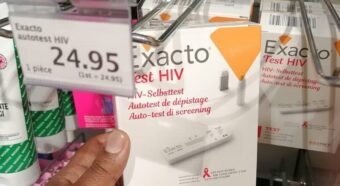The Global Fund to fight AIDS, Tuberculosis and Malaria organized the 6th Partnership Forums for the Africa region from 15 to 18 February 2021. The Forums, entirely virtual due to the COVID-19 restrictions, reviewed input received on Strategy development to date and collected the perspectives of a wide range of stakeholders. The Strategy is a roadmap to guide the Global Fund towards the year 2030. The virtual Partnership Forums were launched with a global opening on 2 February, followed by three regional events. A global closing session will take place on 15 March.
Articles on EECA & LAC (Voices of the People I), Africa and the Middle East and North Africa I (MENA I) (Voices of the People II) and the Asia & Pacific with MENA III (Voices of the People III) meetings can also be found in this issue of the Global Fund Observer, together with an article on the Global Fund Advocates Network (GFAN) discussions (Voices of the People V).
In addition to the plenary sessions, discussions were organized around breakout sessions. The breakout sessions covered: Delivering outcomes against the three diseases; Integration and systems for health; Adapting to a changing environment; Equity, human rights, and gender; Key and vulnerable populations (KVPs); Civil society engagement and leadership of the response; Strengthening impact by country context; Partnerships to support effective implementation; Resource mobilization; and Market shaping, Procurement, Supply-chain and bringing innovations to scale.
Participants in the Partnership Forum
Participants represented African governments, civil society organizations (CSOs) and communities of people living with or affected by the three diseases. Among more than 150 invitees, less than 20% of them represented government implementers from Sub-Saharan Africa who manage approximately 70% of the Global Fund grants in this region. This region is represented on the Global Fund Board by two constituencies, Eastern and Southern African (ESA) and West and Central Africa (WCA). The constituencies are supported by the African Constituency Bureau which acts as their Secretariat. The African Constituency Bureau was formally launched in 2017 because, while African governments recognized that the Global Fund has provided valuable support to the African continent to save millions of lives, despite the Global Fund’s participatory approach in its decision-making ‘African voices were not adequately heard in global health discussions’.
Among the Forums’ attendees were Dr. Zweli Mkhize, South Africa’s Minister of Health and Board Member for ESA, Dr. Lia Tadesse, Minister of Health for Ethiopia, Dr. Brigadier General Gerald Gwinji, the alternate board member for ESA from Zimbabwe, and Professor Pascal Niamba, the Chairman of Burkina Faso’s Country Coordinating Mechanism (CCM) and Board Member for WCA.
African constituencies’ top priorities
In order to help African representatives to collect the inputs of the different countries and represent them effectively during the development of the Global Fund Strategy, the African Constituencies Bureau organized 20 regional consultative meetings on different topics with nominees designated by their CCMs. Those representatives were members of governments, civil society and communities. The collected insights from the consultative meetings were supplemented with commissioned thematic research to obtain evidence-based materials.
The findings of the consultative meetings and the research, presented as the key priorities, are reflected in a news article, the advocacy campaign AfricanVoice4GF, and related position statements.
The African Constituencies’ highest priorities are for the next Strategy to: (i) focus on HIV, tuberculosis (TB) and malaria as the Global Fund’s core mandate; (ii) strengthen resilient and sustainable systems for health (RSSH), including community systems, which would then contribute to Global Health Security; (iii) address human rights, gender and equity; (iv) reorient partnerships to optimize the Global Fund’s ability to achieve its ambitious mission amid unique challenges; and (v) support the West and Central Africa region, which is particularly lagging behind, to improve its performance.
Focus on HIV, TB and malaria
The three diseases remain a priority as 67% of people living with HIV, 25% of TB cases and 92% of malaria cases, globally, are in Sub-Saharan Africa. In the past two decades, the region has received substantial investments from the Global Fund. These investments, together with those of other partners and governments, have helped to significantly reduce mortality from those diseases in the region. For example, from 2010 to 2020, there was a 40% decrease in AIDS mortality in ESA, according to the Joint United Nations Programme on HIV/AIDS (UNAIDS).
Nevertheless, in spite of the considerable investments in SSA and notable declines in mortality, the region is still off-track to reach the United Nations Sustainable Development Goal (SDG) target 3.3 of ending the HIV, TB and malaria epidemics by 2030. These targets were also designed before the COVID-19 pandemic that has significantly affected health service delivery in this and other regions. Thus, it is unlikely that these epidemics will end without consequent and sustained investment in responses to these diseases and the health systems through which the disease programs are delivered.
Strong health systems are essential to end the epidemics
The African Constituencies called for investments in health systems that are nested within countries’ health plans and systems for sustainability. They strongly recommended that the Global Fund consider standalone grants to strengthen health systems when a country context makes it possible, as used to be the case under earlier Global Fund application rounds. It is not clear to the Constituencies why this is not still the case; currently, interventions to strengthen RSSH are usually included in the disease grants. While this practice limits the number of Principal Recipients and reduces management costs, it often leads to ‘suboptimal performance because the disease programs are not best placed to implement/manage broader health systems strengthening interventions’, as the Global Fund Technical Evaluation Review Group (TERG) has asserted. The Global Fund’s Technical Review Panel (TRP) explained that when the disease programs submit funding requests in different funding application windows (there were eight windows for the grant cycle 2020-2022), with RSSH activities split between diseases, it becomes difficult to evaluate those RSSH interventions.
The Global Fund divides its resources into the three diseases so that 50% is allocated for HIV, 18% for TB and 32% for malaria. Countries themselves currently have the responsibility for deciding how much of the three diseases’ allocations go towards RSSH, and the amount or grant for RRSH is included within the disease grant. The split at country level depends on the burden of the diseases and other available funding. For example, WCA spends 56% of its Global Fund grants on malaria; the sub-region was home to about 68% of malaria deaths worldwide in 2019, according to the World Health Organization (WHO) malaria report. Standalone RSSH grants, not attached to any disease program and with its own document, would allow countries to manage designated RSSH funds, within the country’s allocation, separately from disease programs. These RSSH grants could be used to strengthen data systems or procurement and supply chain, for instance. Such resources could be supplemented with government co-financing and other donors’ funding. To prove the feasibility of the concept, the Global Fund could set up a pilot project for standalone grants in a similar way as it has piloted the CCM Evolution Project, before rolling it out to other countries. This pilot would look at why separate health system strengthening grants had not worked well previously and ensure that mechanisms to address the identified weaknesses of separate RSSH grants would be built into the pilot project design.
Domestic resources
Financing is an important component of health systems. African governments need to invest more of their domestic resources to help fund the fight against the three diseases and strengthen the underlying health system. However, while governments may acknowledge the need to make more effort to meet their Abuja declaration pledge to set a target of allocating at least 15% of their annual budget to improve the health sector; at the same time, this comes as an almost insurmountable obstacle to resource-poor African countries. Only four or so countries meet the Abuja declaration and 18 of them spend less than 5%. Moreover, given the impact that COVID-19 has had on diverting spending from other health priorities, the likelihood of countries meeting the Abuja Declaration has receded even further into the distance.
The Constituencies recommended that the low-income African countries spend their co-financing on health system strengthening following the Global Fund Sustainability, Transition and Co-financing policy. To overcome the challenge of accounting for co-financing commitments, governments ideally need to develop national health accounts as part of health systems strengthening for their countries, or use their public finance management system. Currently, many countries spend their co-financing on purchasing commodities, partly because it then becomes easier to provide proof of meeting co-financing commitments.
Read More.
By Djesika Amendah


